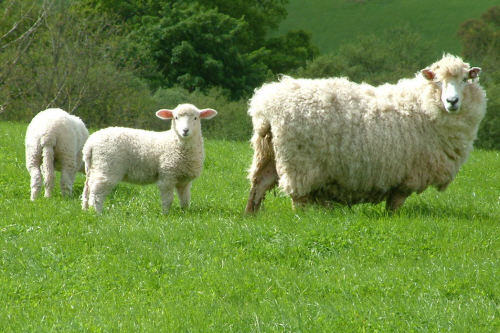With spring fast approaching the parasite Nematodirus is a deadly threat to the lives of lambing flocks. An online risk forecast could help UK sheep farmers assess the risk of outbreaks of the parasite in their lambs and take action before it is too late. The forecast maps will be updated daily to track changes in risk throughout the spring and early summer and include treatment and management advice.
The online risk forecast has been developed by SCOPS (Sustainable Control of Parasites in Sheep) and researchers at the University of Bristol’s School of Veterinary Sciences to predict when Nematodirus eggs will hatch and when outbreaks are likely to happen.
Nematodirosis, caused by the gutworm Nematodirus battus, is a deadly disease affecting young lambs. Eggs deposited on pasture by lambs the previous year hatch together in spring, triggered by a period of chilling over winter followed by warmer weather. Young lambs take in large numbers of larvae as they graze, which damage their gut leading to foetid black diarrhoea (black scour) and death.
Predicting when outbreaks might happen is becoming increasingly difficult due to variation in spring temperatures from year to year. Farmers can no longer rely on a standard timetable of treatments to avoid disease. As the damage is done by the larvae, faecal egg counts are of little use in detecting and controlling Nematodirus in young lambs.
The forecast takes advantage of the temperature-driven synchronised hatching of the Nematodirus larvae and uses weather data from 140 weather stations provided by the Met Office and Forecast.io. The interactive Google map allows farmers and advisers to select the nearest or most representative weather station and provides advice on how to relate the predicted risk to their particular farm and treatment options.
Cases of nematodirosis and eggs detected in routine faecal worm egg counts will also be mapped anonymously as they arise to improve the forecasts and SCOPS are asking farmers, advisors and diagnostic labs to contribute to these records by emailing researcher Dr Hannah Rose at the University of Bristol’s Vet School.
Dr Rose said: “In previous years 64 per cent of farmers and advisors surveyed changed the timing or extent of treatment – or advised treatment - after consulting the forecast, which has been running since 2013, and 93 per cent felt that their approach to control of this parasite had changed as a result of the forecast.”
UK Government funding provided by the Biotechnology and Biological Sciences Research Council has enabled further development of the forecast and it is hoped that even more farmers will benefit in 2016.
Further information
The forecast is based on a model developed and tested by Dr Eric Morgan, Dr Jan van Dijk, Dr Hannah Rose and colleagues at the University of Bristol.
Van Dijk, J. & Morgan, E. R. (2008) The influence of temperature on the development, hatching and survival of Nematodirus battus larvae. Parasitology, vol. 135, pp. 269-283.
Gethings, O. J., Rose, H., Mitchell, S., van Dijk, J. & Morgan, E. R. (2015) Asynchrony in host and parasite phenology may decrease disease risk in livestock under climate warming: Nematodirus battus in lambs as a case study. Parasitology, vol. 142, pp. 1306-1317.
Research conducted at the University of Bristol was funded by the Biotechnology and Biological Sciences Research Council (BBSRC), a UK Government funded research council. The development of the Nematodirus forecast for 2016 was funded as part of a BBSRC Impact Acceleration award made through the University of Bristol
About SCOPS (Sustainable Control of Parasites in Sheep)
SCOPS is an industry led group that represents the interests of the sheep industry. It recognises that, left unchecked, anthelmintic resistance (AR) is one of the biggest challenges to the future health and profitability of the UK sheep industry.
The SCOPS group was formed to develop sustainable strategies for parasite control in sheep, facilitate and oversee the delivery of these recommendations to the industry and ensure that new research and development is incorporated to refine and improve advice given to the sheep industry.
SCOPS includes representatives from a wide range of industry organisations.
About BBSRC
The Biotechnology and Biological Sciences Research Council (BBSRC) invests in world-class bioscience research and training on behalf of the UK public. Our aim is to further scientific knowledge, to promote economic growth, wealth and job creation and to improve quality of life in the UK and beyond.
Funded by Government, BBSRC invested over £509M in world-class bioscience in 2014-15. We support research and training in universities and strategically funded institutes. BBSRC research and the people we fund are helping society to meet major challenges, including food security, green energy and healthier, longer lives. Our investments underpin important UK economic sectors, such as farming, food, industrial biotechnology and pharmaceuticals.
For more information about BBSRC strategically funded institutes see: http://www.bbsrc.ac.uk/institutes
